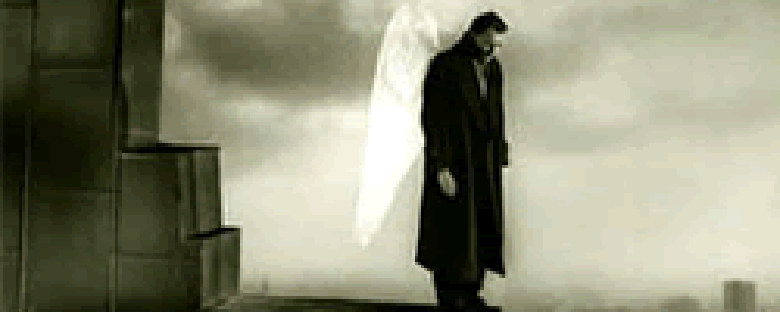Reviews
Der Himmel über Berlin
Wim Wenders
Germany, 1987
Credits
Review by Charles Hartney
Posted on 11 July 2004
Source MGM DVD
“ When the child was a child, it walked with its arms swinging. It wanted the stream to be a river, the river to be a torrent, and this puddle to be the sea.”
At first glance, Wim Wenders’ Wings of Desire exudes a certain pretension of maturity. From Henri Alekan’s stark black and white cinematography to the film’s emphasis on atmosphere rather than dialogue, Wings of Desire seems to posture with an elitist, art house sensibility. Ultimately, however, the movie does not ask its audience to grow up, but to become kids again.
As the film opens, the audience sees Berlin through the eyes of two angels, Damiel and Cassiel. Wenders allows us to gaze from an angel’s view upon the everyday problems of man: the noise of the city and the radio stations, self-loathing, money problems, parents lamenting the mistakes of their children, a woman enduring labor. Damiel and Cassiel have been passive observers of this world for millennia; they have seen it all before.
But soon Damiel begins to voice his dissent with his passive existence. Rather than living for eternity, he wants to live for the moment. He expresses yearning for the basest human experiences, from feeding the cat to having his fingers blackened by a newspaper. More than anywhere else, Damiel finds this passion for life at the local circus. Among the children in the crowd, he craves mortality.
Wenders’ interest in the innocence and happiness of childhood permeates the film. Only children, with the occasional exception, are able to see or sense the angels. And in the circus, Damiel finds his love for life in the same place as many children. He is the hyperbolic representation of old age, an omnipotent being that has existed longer than history itself. The only place Damiel finds a remedy for his monotonous existence is in the amusements of a child.
When Damiel transmutes and becomes human, his proverbial fall from grace bloodies him, and allows him to learn his first color: red. In one of the film’s most striking images, Damiel begins his human journey in front of the Berlin Wall. From his blood, the pipes on the ground, and the graffiti on the Wall, he begins to learn the colors of the world, which he has been blind to for eternity. Two years before it came down, Wenders uses the Wall as a manifestation of the human experience. From the Wall, Damiel learns to harness his most tangible change from angel to human, the color in his sight. The Wall allows Damiel to become, essentially, entirely human.
After his transmutation, Damiel sees the world from an entirely new perspective, from the impressionable point of view of a child. And like Damiel, the audience is startled by this change. Wenders changes visual filters in an instant, from the steely gray of the angels’ sight to the lush colors of Berlin. Perhaps Wings’ greatest accomplishment is its ability to make its audience, like Damiel, view the world anew, to watch for two hours with the wide-eyed amazement of a child.
By the end of the film, the audience is almost completely separated from earthly concerns. No longer do we consider the self-loathing, the money problems, or the noise of Berlin. Instead we are swept up in Damiel’s world of innocence and awe for life and for love.
The Europeans have always understood atmosphere better than American filmmakers. American filmmakers like John Ford have always utilized plot-driven narratives, while European masters like Leone and Tarkovsky created cinema in which audiences exist rather than follow artificial storylines. In Wings, Wenders emulates his European predecessors.
Rather than bog his audience down in narrative, Wenders envelopes the audience in his film’s richly analytical and other-worldly tone. Instead of drowning its audience in half-hearted sentimentalism (like the American remake City of Angels), Wings of Desire allows you to breathe and to ponder the life-affirming message in Damiel’s transmutation.
The poet Homer (Curt Bois) makes perhaps Wenders’ most autobiographical statement. “And if mankind once loses its storyteller, then it will lose its childhood.” For Wenders, storytellers like himself give the world a chance to regress into childhood, a chance to extricate themselves from adult concerns. And this idea is no more prevalent than in Wings of Desire, which allows its audience to consider the questions of childhood and, like Damiel, to become young again.
We don’t do comments anymore, but you may contact us here or find us on Twitter or Facebook.



